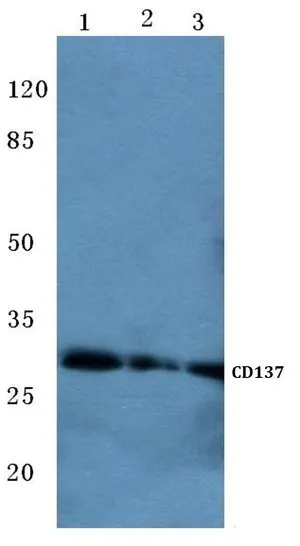CD137 antibody
GTX10459
ApplicationsFlow Cytometry, ImmunoFluorescence, Western Blot, ELISA, ImmunoCytoChemistry
Product group Antibodies
TargetTNFRSF9
Overview
- SupplierGeneTex
- Product NameCD137 antibody
- Delivery Days Customer9
- Application Supplier NoteWB: 0.1 microg/ml. ICC/IF: 5-15 microg/ml. FACS: 2.5 microg/106 cells. ELISA: 0.2-0.8 microg/ml. *Optimal dilutions/concentrations should be determined by the researcher.Not tested in other applications.
- ApplicationsFlow Cytometry, ImmunoFluorescence, Western Blot, ELISA, ImmunoCytoChemistry
- CertificationResearch Use Only
- ClonalityPolyclonal
- ConjugateUnconjugated
- Gene ID3604
- Target nameTNFRSF9
- Target descriptionTNF receptor superfamily member 9
- Target synonyms4-1BB, CD137, CDw137, ILA, IMD109, tumor necrosis factor receptor superfamily member 9, 4-1BB ligand receptor, CD137 antigen, T cell antigen ILA, T-cell antigen 4-1BB homolog, homolog of mouse 4-1BB, induced by lymphocyte activation (ILA), interleukin-activated receptor, homolog of mouse Ly63, receptor protein 4-1BB
- HostGoat
- IsotypeIgG
- Protein IDQ07011
- Protein NameTumor necrosis factor receptor superfamily member 9
- Scientific DescriptionCD137 exists on the cell surface as a monomer with a molecular mass of 30 kDa and as a dimer of 55 kDa. Human and mouse CD137 share 60% amino acid identity. CD137 (4-1BB), a member of the tumor necrosis factor receptor superfamily, is a type I transmembrane glycoprotein expressed on the cell surface of activated splenic T cells and thymocytes. The functions of CD137 in T lymphocytes include regulating activation, proliferation and apoptosis. CD137 and CD28 are costimulatory molecules of T cell activation. Costimulatory molecules are important in initiating anti-tumor immune responses. CD137 plays an important role in regulating T-cell-dependent immune responses. Expression of CD137 correlates negatively with lymphocyte proliferation and positively with the degree of activation-induced cell death caused by mitogen overstimulation. In monocytes, CD137 induces activation, promotes adherence and prolongs survival.
- Storage Instruction-20°C or -80°C,2°C to 8°C
- UNSPSC12352203




